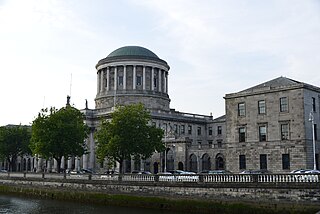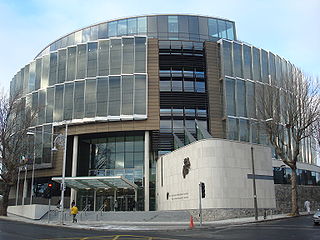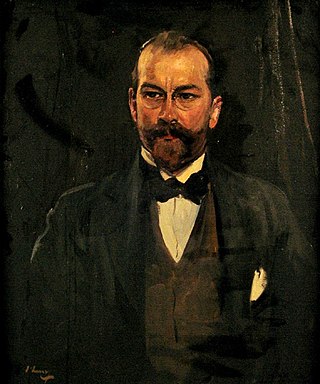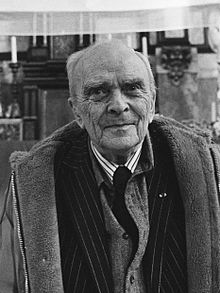
An arrest is the act of apprehending and taking a person into custody, usually because the person has been suspected of or observed committing a crime. After being taken into custody, the person can be questioned further and/or charged. An arrest is a procedure in a criminal justice system, sometimes it is also done after a court warrant for the arrest.

Gerald Boland was an Irish Fianna Fáil politician who served as Minister for Justice from 1939 to 1948 and 1951 to 1954, Minister for Lands from 1936 to 1939, Minister for Posts and Telegraphs from 1933 to 1936 and Government Chief Whip from 1932 to 1933. He served as a Senator from 1961 to 1969 and a Teachta Dála (TD) for the Roscommon constituency from 1923 to 1961.

The Supreme Court of Ireland is the highest judicial authority in Ireland. It is a court of final appeal and exercises, in conjunction with the Court of Appeal and the High Court, judicial review over Acts of the Oireachtas. The Supreme Court also has appellate jurisdiction to ensure compliance with the Constitution of Ireland by governmental bodies and private citizens. It sits in the Four Courts in Dublin.

The Special Criminal Court is a juryless criminal court in Ireland which tries terrorism and serious organised crime cases.
The High Court of Ireland is a court which deals at first instance with the most serious and important civil and criminal cases. When sitting as a criminal court it is called the Central Criminal Court and sits with judge and jury. It also acts as a court of appeal for civil cases in the Circuit Court. It also has the power to determine whether or not a law is constitutional, and of judicial review over acts of the government and other public bodies.
The Internal Security Act 1960 was a preventive detention law in force in Malaysia. The legislation was enacted after the Federation of Malaya gained independence from Britain in 1957. The ISA allows for detention without trial or criminal charges under limited, legally defined circumstances. On 15 September 2011, the Prime Minister of Malaysia, Najib Razak said that this legislation will be repealed and replaced by two new laws. The ISA was replaced and repealed by the Security Offences Act 2012 which has been passed by Parliament and given the royal assent on 18 June 2012. The Act came into force on 31 July 2012.

George Gavan Duffy was an Irish politician, barrister and judge who served as President of the High Court from 1946 to 1951, a Judge of the High Court from 1936 to 1951 and Minister for Foreign Affairs from January 1922 to July 1922. He served as a Teachta Dála (TD) for the Dublin County constituency from 1921 to 1923. He served as a Member of Parliament (MP) for the Dublin South constituency from 1918 to 1921.
The Morris Tribunal was a public inquiry to address allegations of the 1990s and early 2000s against the Garda Síochána, the national police force of Ireland. Subjects explored included suggestions of corrupt and dishonest policing in County Donegal but its recommendations and conclusions have more widespread consequences and importance.
The Christmas Raid was an attack on 23 December 1939 by the Irish Republican Army (IRA) against the Irish Army and the Phoenix Park Magazine Fort—Ireland's largest munitions dump. The attack resulted in the capture of the munitions dump by the IRA and the seizure of a huge quantity of weapons. Although the operation was initially successful, two of the raiders were captured shortly after the raid and, in the following days, most of the stolen military equipment was recovered and several IRA volunteers were arrested.

Operation Demetrius was a British Army operation in Northern Ireland on 9–10 August 1971, during the Troubles. It involved the mass arrest and internment of people suspected of being involved with the Irish Republican Army (IRA), which was waging an armed campaign for a united Ireland against the British state. It was proposed by the Unionist government of Northern Ireland and approved by the British Government. Armed soldiers launched dawn raids throughout Northern Ireland and arrested 342 in the initial sweep, sparking four days of violence in which 20 civilians, two IRA members and two British soldiers were killed. All of those arrested were Irish republicans and nationalists, the vast majority of them Catholics. Due to faulty and out-of-date intelligence, many were no longer involved in republican militancy or never had links with the IRA. Ulster loyalist paramilitaries were also carrying out acts of violence, which were mainly directed against Catholics and Irish nationalists, but no loyalists were included in the sweep.

The Internal Security Act 1960 (ISA) of Singapore is a statute that grants the executive power to enforce preventive detention, prevent subversion, suppress organized violence against persons and property, and do other things incidental to the internal security of Singapore. The present Act was originally enacted by the Parliament of Malaysia as the Internal Security Act 1960, and extended to Singapore on 16 September 1963 when Singapore was a state of the Federation of Malaysia.
The Offences Against the State Acts 1939–1998 form a series of laws passed by the Irish Oireachtas.

Sir Richard Dawson Bates, 1st Baronet, known as Dawson Bates, was an Ulster Unionist Party (UUP) member of the House of Commons of Northern Ireland.

Capital punishment in the Republic of Ireland was abolished in statute law in 1990, having been abolished in 1964 for most offences including ordinary murder. The last person to be executed was Michael Manning, hanged for murder in 1954. All subsequent death sentences in the Republic of Ireland, the last handed down in 1985, were commuted by the President, on the advice of the Government, to terms of imprisonment of up to 40 years. The Twenty-first Amendment to the constitution, passed by referendum in 2001, prohibits the reintroduction of the death penalty, even during a state of emergency or war. Capital punishment is also forbidden by several human rights treaties to which the state is a party.

The Civil Authorities Act 1922, often referred to simply as the Special Powers Act and known as the "Flogging Act", was an act passed by the Parliament of Northern Ireland during the partition of Ireland and shortly after the establishment of Northern Ireland. The Act was renewed annually and in 1928 was renewed for five years and made permanent in 1933 and not repealed until 1973. Its sweeping powers made it highly controversial, and it was seen by much of the Irish nationalist community as a tool of Ulster unionist oppression. The Act was eventually repealed by the Northern Ireland Act 1973, following the abolition of Northern Ireland's parliament and the imposition of direct rule by the British government.
The Constitution Act 1931, popularly called the Public Safety Act 1931, was an Act of the Oireachtas of the Irish Free State amending the Constitution of the Irish Free State. It inserted Article 2A which empowered the Executive Council to declare a state of emergency during which most provisions of the constitution could be suspended and extra security measures taken. These measures included the uses of the Constitution Tribunal, a military tribunal, to try civilians for political offences, granting extra powers of search and arrest to the Garda Síochána (police), and the prohibition of organisations deemed a threat to the state's security.
George Plant was a member of the Irish Republican Army (IRA) who was executed by the Irish Government in 1942.

Minister for Justice, Equality and Law Reform v Murphy, [2010] IESC 17; [2010] 3 IR 77, is an Irish Supreme Court case in which the Court determined that inpatient treatment with a restriction order attached to it in a European Arrest Warrant came within the meaning of "detention order" in s.10(d) of the European Warrant Act 2003. This gave the definition of "detention order" a wide meaning. The case involved an appeal against extradition to the United Kingdom.
Patrick MacGrath was born into an old Dublin republican family and took part in the 1916 Rising, as did two of his brothers. He was sent to Frongoch Internment Camp after the 1916 Rising and served his time there. He was a senior member of the Irish Republican Army (IRA), hunger striker, IRA Director of Operations and Training during its major bombing/sabotage in England and was the first of six IRA men executed by the Irish Government between 1940–1944. After participating in the Easter Rebellion, MacGrath remained in the IRA, rising in rank and becoming a major leader within the organisation.

Damache v DPP [2012] IESC 11; [2012] 13 ILRM 153; [2012] 2 IR 266 is an Irish Supreme Court case which considered whether section 29(1) of the Offences Against the State Act 1939 was unconstitutional. This statutory provision allowed a member of An Garda Siochana, who possessed a rank not below that of superintendent, to issue a search warrant to another Garda who possessed a rank not below that of sergeant. The Supreme Court held that any search warrant issued by a person who is associated with the investigation was invalid. In this case, such a person was a deemed to be a member of the Gardaí. Thus, section 29(1) was declared unconstitutional and any evidence taken from the search warrant was inadmissible.













